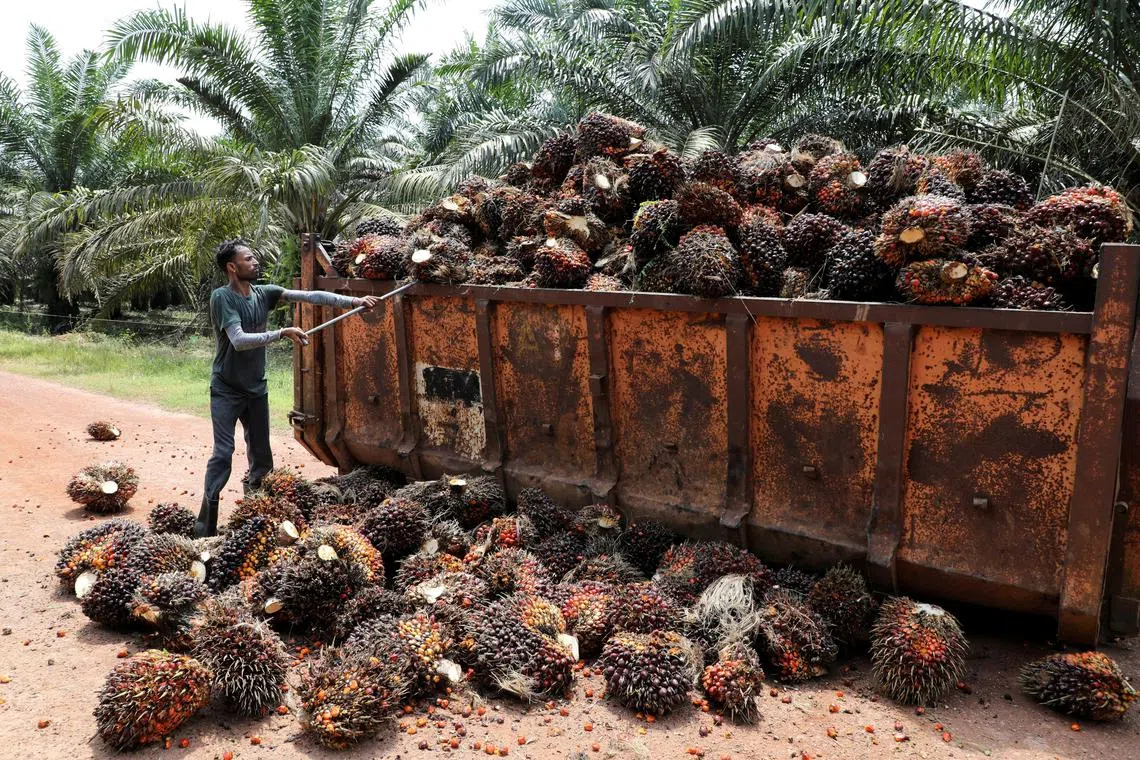Indonesia to suspend some palm oil export permits: Officials
Sign up now: Get ST's newsletters delivered to your inbox

Palm oil exporters had accumulated large shipment quotas last year and they now had little incentive to supply the domestic market.
PHOTO: REUTERS
Follow topic:
JAKARTA - Indonesia will suspend some palm oil export permits to secure domestic supply
Palm oil exporters had accumulated large shipment quotas in 2022 and they now have little incentive to supply the domestic market, he said.
Indonesia issues export permits for palm oil companies that have already sold a proportion of their products to the domestic market, under a policy known as “Domestic Market Obligation” (DMO).
The DMO currently allows export volumes that are six times what companies have sold at home.
“Exporters can use those export rights after the situation has calmed,” said Mr Luhut, Coordinating Minister for Maritime Affairs and Investment.
Mr Firman Hidayat, an official at the same ministry, said about a third of existing export quotas could be used now, while the rest could be used after May 1.
He added that exporters were holding around 5.9 million tonnes worth of export permits at the end of January.
Exporters can increase their quota when they raise supplies to the domestic market, he said.
Palm oil is used in everyday products from cooking oil and chocolates to detergent and animal feed. Indonesia is the world’s leading palm oil exporter, according to data from market and consumer data tracker Statista. It produced 51.3 million tonnes of palm oil in 2022 and exported 33.7 million tonnes, as estimated by the Indonesian Palm Oil Association (GAPKI).
It estimated 50.82 million tonnes of output and 26.42 million tonnes of exports in 2023.
In 2020, Singapore imported US$228 million (S$302 million) in palm oil from Indonesia, accounting for 58 per cent of the Republic’s total palm oil imports. Singapore also imports palm oil from Malaysia, the Netherlands, Kenya and Vietnam, according to The Observatory of Economic Complexity.
The price of oils and fats in Singapore rose 7.1 per cent in 2022, as compared with 2021, but fell 1.5 per cent in December 2022, compared with the previous month, data from the consumer price index showed.
Retailers have complained that cooking oil packages at lower prices have been hard to procure and they have been forced to sell them above the regulated price of 14,000 rupiah (S$1.20) per litre.
The Trade Ministry said in January that palm oil companies had been ordered to increase domestic supply to 450,000 tonnes per month until April, up from roughly 300,000 tonnes per month previously.
Food prices typically rise ahead of the Islamic month of Ramadan and the Eid al-Fitr celebration, which falls in April this year.
The chair of the Indonesia Palm Oil Board, Mr Sahat Sinaga, said companies have been holding back exports, due to lower global market prices and high export levies. With little urgency for exports, companies were also not encouraged to meet their DMO.
Malaysian benchmark palm oil prices have fallen more than 40 per cent since reaching a peak in 2022. Meanwhile, Indonesia resumed imposing export levies in November.
Mr Sahat blamed distributors for the tight supply in the domestic market.
“This is a difficult situation, but everybody must work together. Distributors should not take advantage of the situation,” he said.
Rattling global edible oil markets, Indonesia banned exports of palm oil for three weeks in 2022 due to soaring cooking oil prices.
But palm oil prices have since fallen back sharply to stabilise at lower levels, as the outlook is now less certain, with energy prices off their highs and fears over a global recession.
Malaysia’s palm oil futures market was closed on Monday for a public holiday. REUTERS

